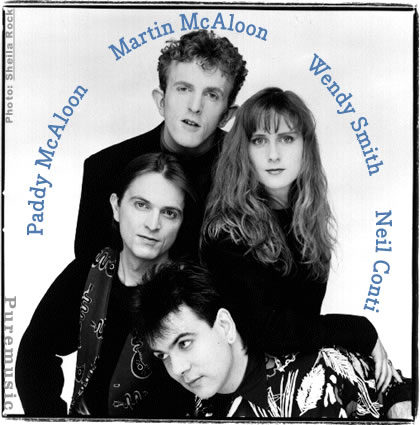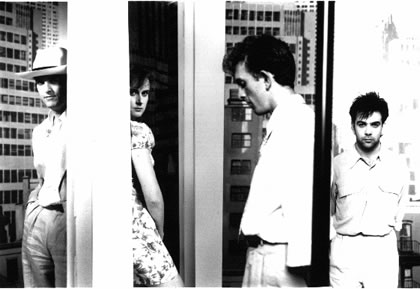
A Conversation with
Thomas Dolby
(continued)
TD: But I think that was what led Paddy to make the decision to re-record the new versions of those songs acoustically. And the nice thing is that that gives us new interpretations, different interpretations of those songs. Given the distance that he now has from that era, it definitely throws some new light on the songs.
PM: On top of the fact that this time he really took a much more high-handed, perfectionist stab at the acoustic versions thereof.
TD: Yeah, I think that's right.
PM: And got some great performances as a result.
TD: Yeah. And one of the things about that era compared to today is that you had one shot at it. If you were lucky enough to get signed to a major label and given a budget to go into the studio, you really had one shot at it. It was all or nothing. And if you were lucky enough to get the record out, and it was successful, then you're stuck with that version, that snapshot of the songs for years to come. But in reality, for a songwriter like Paddy, music is not a rigid thing, it's fluid. So sometimes it's uncomfortable to be sort of landed with this one instant in time where you made your master of the song. What's nice these days I find is that between downloads and podcasts and iTunes, plus the cheaper economics of recording and manufacturing CDs, there doesn't have to be one definitive version of the song. It's not this all or nothing thing anymore.
PM: What about the songs not taken? Do you know much about them, the unchosen from that 40 or 50, did they end up somewhere, are they just under the bed somewhere?
TD: They're probably back under the bed, quite frankly.
PM: Right.
TD: And every time I--every few years I've gone to see Paddy, and he'll play me some other stuff that he has lying around, and very little of it ever sees the light of day. He had whole entire album projects abandoned, basically, for one reason or another.
PM: On this new deluxe addition, do you know why the bonus tracks of the original were not included, "Yearning Loins," and "He'll Have To Go"?
TD: I don't know why they weren't included, no.
PM: Just one of those record company things.
Paddy's language, both the musical and the lyrical language, is so unique. But when it comes to things like unusual voicings of chords and elements of harmony, is that generally the artist or the producer's hand at work there?
TD: Oh, I think for every relationship between artists and producer there's a different story every time. I mean, in this case, the choices that we made, I'd say, were certainly collaborative. And I feel that I was handed the responsibility by the label to sort of supervise those choices, and there was very little involvement from the label in terms of coming in and saying, "Well, we like this as a single," or, "these choices for the album," or, "Could you make this a little bit more catchy," or whatever. We were pretty much left to our own devices. But a lot of the songs, things just fell into place, and in many ways my job was very easy.

PM: So this edition that you've digitally remastered, how extensive a project did that turn out to be? And what did it take, gear-wise and sonically, to get it where you wanted it?
TD: It was not extensive like when George Martin goes back into the Sgt. Pepper multi-tracks.
PM: Right.
TD: I used the mixed masters, which were on analog, quarter-inch tape. We fed them through modern equipment, and we just let them breathe. When you cut vinyl in the old days you had to make a lot of compromises to the dynamic level, just to get certain things on vinyl was quite hard. When I think of a mastering engineer looking through his microscope at the grooves in the master, it seems like something out of H. G. Wells. But that was the technology that existed at the time. My task was not to sort of reinvent the album, because it was great to begin with.
TD: So you didn't have to mess with too much with EQ, and all that stuff?
TD: A little bit. We were able to do that with a free hand without having to make any of those compromises that one used to in the vinyl era. But I didn't try to change it, really, I just wanted it to breathe. continue
print (pdf) listen to clips puremusic home